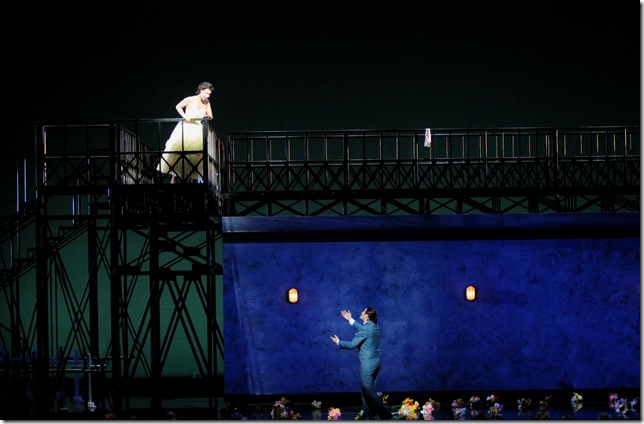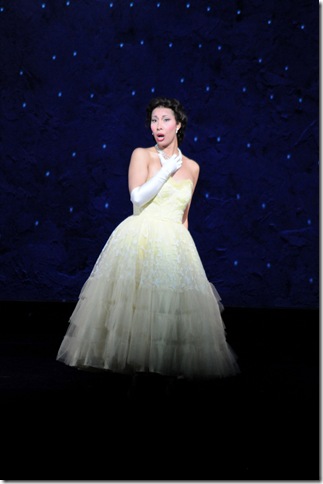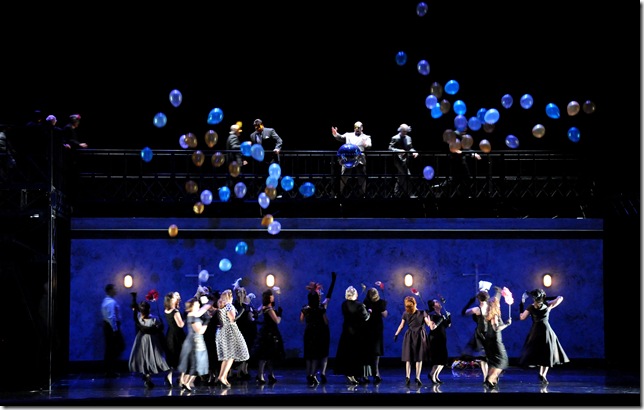Palm Beach Opera was working out some kinks Friday night as it tried on the theatrical clothes of a new production, but in the end, it achieved a satisfying and reasonably compelling telling of a classic love story.
Charles Gounod’s Roméo et Juliette, a tuneful, sentimental example of French Romantic opera at its most endearing, is the third production in the West Palm Beach-based company’s current season. It stood out for its brand-new interpretation, provided by the young American director Kevin Newbury, and for the singing of several of its principals.
Newbury has moved the action of Shakespeare’s original story (and the opera) from medieval Verona to the same city in the post-World War II era, a more fashion-conscious time that meant everyone on stage looked terrific in Paul Carey’s costumes. All the action took place on and around a two-story superstructure with a moveable wall for interiors and exteriors, and the floor above used for the balcony scene and some important entrances, such as the duke.
The iconography was of course heavily Catholic, with large silver crosses used on the wall of Frère Laurent’s cell and brought in to declare the death of Mercutio; there were several orders of the priesthood among the supernumeraries, and there was much crossing of foreheads, lips and chests by one and all. There was plenty of busy action, particularly in the dance-like fight scene choreographed by Doug Scholz-Carlson, and Newbury likes to bring his chorus together in crowd-of-bystanders style, which worked for singing purposes, but was a bit clunky visually.
It looked good overall, though in the opening party scene, meant to be a night event (with a barely turning mirror ball that occasionally sent lasers of unpleasant light into the eyes), D.M. Wood’s backlit concept made things somewhat too dark, even if it did make two later spots on Roméo and Juliette stand out. In general, this was a handsome show with a smart design, and it should travel well.
It works even better if the music is sung well, and in the American soprano Nicole Cabell, the opera has a very fine Juliette. She looked radiant, lovely and young in a bright yellow dress, and from her first big aria, Je veux vivre, she showed off a soprano that is well-suited for this repertoire.
This is a voice with ease throughout its registers, and a slightly smoky alto-like coloring that made it distinctive. It’s also a strong but not heavy voice, and she climbed to her Cs and Ds with little sign of strain and a naturalness that fit the emotional journey of her character.
Cabell also made a very believable young girl in love, and her voice blended most agreeably with that of her amour, sung by the Mexican tenor Arturo Chacón-Cruz. His performance was also on the money acting-wise, but I found his reedy tenor hard to warm up to at first. In much of the first part – this production presents the original five-act opera in three parts – his intonation was shaky, and the tone quality unpleasantly hard.
But he got better as the night went on, and in the final scene, he had plenty of power left in his voice to sing big for the final love-death duet. His tenor had softened somewhat as well, and when he reached his last outbursts he did so with fine declamatory power.
The finest male voice on stage Friday may have belonged to the young Russian bass Alexander Vinogradov, whose Frère Laurent boasted a voice of huge proportions and a very attractive sound. Even in the long repeated notes of the music leading up to the marriage ceremony, his was an instrument on which every ear hung, and indeed he received a rapturous ovation at the curtain call. Not bad for a secondary role, and his bio indicates that many of his roles (chiefly in Germany) are of secondary characters.
It would be good to hear him do Ochs in Rosenkavalier, or a Boris Godunov, or even bring him back for Germont in next season’s opener, Verdi’s La Traviata. It’s a beautiful, powerful voice, and one hopes he returns to West Palm Beach soon.
Jennifer Rivera was pleasant enough as Stéphano, though it remains an annoying trouser role, and her sweet, soft-edged soprano would be welcome in other parts. David Adam Moore had a strong, well-rounded baritone as Mercutio, though his Queen Mab aria was imprecise, owing mostly to direction from the pit.
This was a good night for the troupe’s Young Artists, particularly Evanivaldo Correa as Tybalt, and Kenneth Stavert as Gregorio. Both singers sounded confident and easeful, and comfortable on stage. Mezzo Shirin Eskandani was a decent Gertrude, and was at her best in the quartet that closes the first scene of Act III, when she, Vinogradov, Chacón-Cruz and Cabell made a delicious sound together.
The opera got off to an uncertain start for about the first half-hour Friday largely because conductor Will Crutchfield chose such a slow tempo to start the opera, and kept things too deliberate and down-tempo for too long thereafter. The first act had very little lift and lightness as a result, and the orchestra, in particular the brasses, sounded haphazard and flabby much of the time.
But again, things picked up after that, in particular after Cabell’s Je veux vivre. The opening music of Act III, for instance, was especially nice, and Crutchfield maintained effective, precise control over the proceedings. The chorus, which plays a large role here, was very good all night long, and sang with warmth, naturalness and tonal accuracy.
***
Before the opera, General Manager Daniel Biaggi announced tentative plans for the 2012-13 season in which the company’s productions would be presented as part of a 12-week “festival” of offerings. The three mainstage operas at the Kravis Center will be Verdi’s La Traviata in January, Rossini’s La Cenerentola in February, and Richard Strauss’ Salome in March, one of the first German-language operas the company has mounted in some time.
Also planned is an outdoor presentation on the West Palm Beach waterfront of Bizet’s Carmen, and in a partnership with Lynn University, a production of Benjamin Britten’s Turn of the Screw, featuring the company’s Young Artists troupe.
***
Roméo et Juliette will be presented at 2 p.m. today at the Kravis Center, with Nicole Cabell and Arturo Chacón-Cruz. Tickets start at $20. Call 833-7888 (Palm Beach Opera) or visit www.pbopera.org; or call the Kravis Center at 832-7469 or visit www.kravis.org.


